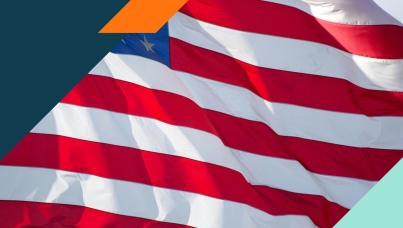Trump and Harris are locked in tight race among voters in swing states
Washington DC, August 8, 2024-- A new poll of Americans living in the swing states of Michigan, Pennsylvania, Wisconsin, Georgia, North Carolina, Arizona and Nevada finds Vice President Kamala Harris and former President Donald Trump are in a statistical dead heat for the presidency. The survey shows that many people in swing states are concerned with inflation, immigration, and political extremism or polarization. When asked how the candidates perform on these, Trump outperforms Harris on inflation and immigration, while neither candidate has a clear lead on the issue of political extremism and polarization.
The survey also explores perceptions of the candidates’ character traits, where Trump is more likely to be seen as a “patriot” but also “weird”, while Harris is more likely to be seen as “moral” and “intelligent”. For Americans living in these swing states, most would like to see Supreme Court reforms, namely a code of ethics and term limits.
To see how these respondents in Michigan, Pennsylvania, Wisconsin, Georgia, North Carolina, Arizona and Nevada felt about the election in June 2024, please click here.
Detailed findings:
1. For registered voters in these swing states, the race remains a dead heat.
- About seven in ten respondents in swing states say they are certain to vote (69%), with Democrats (71%) and Republicans (73%) being equally likely to say so.
- Looking at the ballot question among registered voters, Harris receives 42% of the vote share, Trump receives 40% of the vote share, and Robert F. Kennedy receives 5% of the vote share. Harris and Trump’s margin on the ballot is well within the margin of error, indicating a race that is too close to call. The survey also forced non-Harris / Trump voters to choose between both candidates, showing there is no clear favorite among this group, with 45% choosing Trump, 44% choosing Harris and 10% skipping. Overall, the combined ballot shows 50% support for Harris, 48% for Trump.
2. Inflation and immigration continue to be the most important issue for Americans living in Michigan, Pennsylvania, Wisconsin, Georgia, North Carolina, Arizona and Nevada. Trump is seen as doing better on both issues.
- Inflation (52%) and immigration (32%) continue to be seen as the most important issues facing the country among Americans living in these swing states. Political extremism and polarization are viewed as important by 24% of respondents, followed by crime or gun violence (21%), healthcare (18%) and housing costs or availability (17%).
- Americans living in these swing states perceive Trump as having an advantage over Harris on immigration (+13 pts Trump), war and foreign conflicts (+9 pts Trump), the economy and jobs (+7 pts Trump), and crime or corruption (+5 pts Trump), while Harris has the advantage on healthcare (+9 pts Harris). Americans living in these swing states are equally likely to say Trump (35%) and Harris (35%) perform best on political extremism or threats to democracy.
3. Trump is more likely to be seen as weird and a patriot, while Harris is more likely to be seen as intelligent and moral.
- Looking at perceptions of candidates’ generally, Harris is seen by more voters to be intelligent (+8 pts Harris), moral (+18 pts Harris), and caring about people like them (+4 pt Harris), while Trump is more likely to be seen as weird (+16 pts Trump), a patriot (+12 pts Trump), brave (+5 pts Trump), and lazy (+4 pts Trump). Just over one-third of voters view Harris (37%) and Trump (34%) as having earned their positions.
4. Most Americans living in Michigan, Pennsylvania, Wisconsin, Georgia, North Carolina, Arizona and Nevada support Supreme Court reforms, however increasing the size of the Court draws mixed responses.
- When it comes to policy positions, 61% support imposing term limits for Supreme Court justices of a single 18-year term, and 73% support establishing a binding code of conduct for Supreme Court justices, requiring the disclosure of gifts, non-involvement in political activity, and recusing themselves from cases where they or their spouses have a conflict of interest. Feelings are mixed on whether the number of justices should be increased from 9 to 15, with 34% supporting this change and 39% opposing it.
About the Study
This Ipsos poll was conducted July 31 to August 7, 2024, by Ipsos using the probability-based KnowledgePanel®. This poll is based on a representative probability sample of 2,045 adults age 18 or older from Arizona, Georgia, Michigan, Nevada, North Carolina, Pennsylvania, and Wisconsin.
The survey was conducted using KnowledgePanel, the largest and most well-established online probability-based panel that is representative of the adult US population. Our recruitment process employs a scientifically developed addressed-based sampling methodology using the latest Delivery Sequence File of the USPS – a database with full coverage of all delivery points in the US. Households invited to join the panel are randomly selected from all available households in the U.S. Persons in the sampled households are invited to join and participate in the panel. Those selected who do not already have internet access are provided a tablet and internet connection at no cost to the panel member. Those who join the panel and who are selected to participate in a survey are sent a unique password-protected log-in used to complete surveys online. As a result of our recruitment and sampling methodologies, samples from KnowledgePanel cover all households regardless of their phone or internet status and findings can be reported with a margin of sampling error and projected to the general population. KnowledgePanel members receive a per survey incentive, usually the equivalent of $1 (though for some it is $2) in points, that can be redeemed for cash or prizes. A prenotification email for this study was sent prior to field. Panelists receive a unique login to the survey and are only able to complete it one time. No reminder emails were sent for this study.
The margin of sampling error is plus or minus 2.2 percentage points at the 95% confidence level, for results based on the entire sample of adults. The margin of sampling error takes into account the design effect, which was 1.16. The margin of sampling error is higher and varies for results based on sub-samples. Sampling error is only one potential source of error. There may be other unmeasured non-sampling error in this or any poll. In our reporting of the findings, percentage points are rounded off to the nearest whole number. As a result, percentages in a given table column may total slightly higher or lower than 100%. In questions that permit multiple responses, columns may total substantially more than 100%, depending on the number of different responses offered by each respondent.
The study was conducted in both English and Spanish. The data were weighted to adjust for gender by age, race/ethnicity, education, Census region, metropolitan status, household income, party identification, race/ethnicity by gender, race/ethnicity by age, and race/ethnicity by education. The demographic benchmarks came from 2023 Current Population Survey (CPS) from the US Census Bureau. Party ID benchmarks are from the Pew NPORS 2024 study for the selected states. The weighting categories were as follows:
- Gender (Male, Female) by Age (18–29, 30–44, 45–59, and 60+)
- Race/Hispanic Ethnicity (White Non-Hispanic, Black Non-Hispanic, Other or 2+ Races Non-Hispanic, Hispanic)
- Education (High School graduate or less, Some College, Bachelor and beyond)
- State
- Metropolitan status (Metro, non-Metro)
- Household Income (Under $25,000, $25,000-$49,999, $50,000-$74,999, $75,000-$99,999, $100,000-$149,999, $150,000+)
- Party ID (Republican/lean Republican, Independent/Something else, Lean Democrat/Democrat)
- Race/ethnicity (White/Other Non-Hispanic, Black Non-Hispanic, Hispanic) by Education (Some college or less, Bachelor and beyond)
For more information on this news release, please contact:
Chris Jackson
Senior Vice President, US
Public Affairs
+1 202 420-2025
[email protected]
About Ipsos
Ipsos is one of the largest market research and polling companies globally, operating in 90 markets and employing over 18,000 people.
Our passionately curious research professionals, analysts and scientists have built unique multi-specialist capabilities that provide true understanding and powerful insights into the actions, opinions and motivations of citizens, consumers, patients, customers or employees. We serve more than 5000 clients across the world with 75 business solutions.
Founded in France in 1975, Ipsos is listed on the Euronext Paris since July 1st, 1999. The company is part of the SBF 120 and the Mid-60 index and is eligible for the Deferred Settlement Service (SRD).
ISIN code FR0000073298, Reuters ISOS.PA, Bloomberg IPS:FP www.ipsos.com



